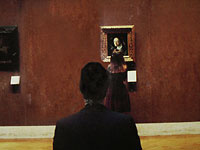Part of Fall 2002
A co-presentation with Trinity Square Video
Jon Jost emerged in the early 70s as one of the pre-eminent independent filmmakers on the American scene. Committed to political, low-budget filmmaking, he started a career of producing such experimentally-minded feature films as Speaking Directly, Last Chants for a Slow Dance, All the Vermeers in New York and The Bed You Sleep In. In the late 90s, he began to explore the range of possibilities afforded by digital imagemaking, and has now crafted an uncompromised approach entirely different from that of his earlier film-based work.
Pleasure Dome is pleased to host Jon Jost as he presents one of his most recent digital video productions, 6 Easy Pieces, a series of visual sketches exploring the limits of the digital camera and its unique ability to capture light. Filmed during his travels through Europe, where he now resides, 6 Easy Pieces examines the historical weight of his surroundings via the visual juxtapositions of modern and ancient vistas. What emerges is a study of the beauty of experience and immediacy.
On Sunday, Nov. 10, Jon Jost will lead a hands-on workshop in digital video aesthetics. Over the course of the afternoon, he will be teaching attendees how to explore the creative potential of digital video and think beyond the standard perceptions of its capabilities as an artistic medium. Attendance is limited to 10 people @ $120 per person ($100 Pleasure Dome and TSV members). Call 416-656-5577 to confirm your participation in the workshop. Video camera is required.
Born in Chicago in 1943, of a military family, Jon Jost grew up in Georgia, Kansas, Japan, Italy, Germany and Virginia. Expelled from college in 1963, he began making 16mm films. He is self-taught. He has made some 20 plus shorts and 14 feature length films, in 16 and 35mm, all of which he has conceived, written, photographed, directed and edited. Since 1996 he has worked in digital video, and has completed 5 feature length works in this medium, and many short pieces.
In 1965 Jost was imprisoned by US Federal authorities for 2 years and 3 months for refusal to cooperate with the Selective Service system. On release, he quickly became engaged in political activities, helping start the Chicago branch of what became Newsreel, the New Left film production and distribution group, as well as working for the draft resistance and the Chicago Mobilization.
Jost made his first feature-length film in 1974, and has since devoted himself to the making of a wide-ranging series of films, largely focused on specifically American topics, in forms ranging from essays (Speaking Directly, Stagefright, and Uncommon Senses), to essay/fictions (Angel City) to avant-garde and new narrative forms. His work has shown widely in museums, film archives, and festivals since 1975. The Museum of Modern Art, New York, presented a complete retrospective of Jost’s work beginning January 18, 1991. This show subsequently traveled to the Kennedy Center, Washington DC, the Harvard Film Archive, the UCLA Film Archive, The Film Arts Foundation of San Francisco, as well as to the Bergamo Film Meeting 1993, the Viennale festival 1993, the Bologna and Torino Film Archives in Italy (1995). Most recently his films were accorded full retrospectives at the Cinemateca Portuguese (1996) and the Filmoteca Español (1997).
His films have been purchased for television broadcast and/or for cinema distribution in the US, UK, Germany, Italy, Portugal, Norway, Hungry, Russia, Canada and Japan. Prints of Jost’s films are held in the archives of The Museum of Modern Art, NY; the British Film Institute, the Freunde der deutschen Kinemathek, The Royal Film Archive of Belgium, the Cinemateca Portuguese, the Filmoteca Español, the Bologna Archive, the National Film Library of Australia (Canberra), the Yamagata Festival of Japan, and the Istituto Luce, Rome.
Jost has been recipient of numerous grants, including a Deutsche Akademischer Austauschdienst Berlin Fellowship (1979; 1985); an NEA UK-US Exchange Fellowship (1980); two NEA Media Production Grants (1985; 1989); a Guggenheim Fellowship (1989); a NYSCA Production Grant (1989) and other minor grants.

